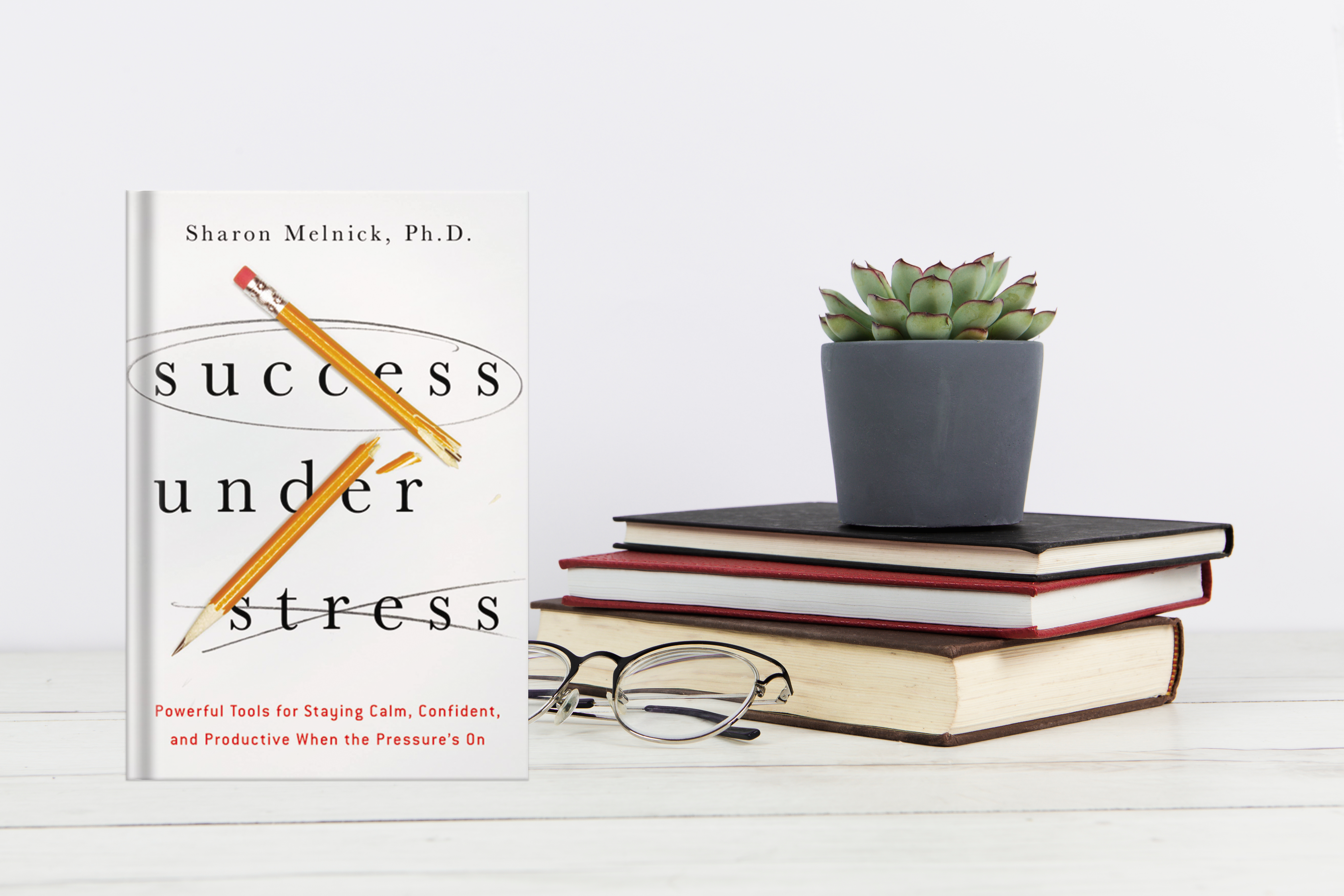The workplace is becoming more and more difficult to navigate and workplace stress levels are at an all-time high.
The average business professional is working on 30 to 100 projects. As if that is not enough, Employees today are disrupted seven times per hour and distracted for up to 2.1 hours per day. And four out of every ten people working in large corporations are facing a significant corporate restructuring, leaving them uncertain about their futures. This could explain why over 40% of adults report being kept awake at night by stressful events from the day.
“People are coming to me for solutions,” says Sharon Melnick, Ph.D., a business psychologist and the author of the recently published Success Under Stress. “Everyone is feeling overwhelmed and overburdened.”
Some of the most common questions include
Is it possible to maintain consistent focus all day long?
Is it possible to get everything accomplished and still have energy after work?
How do you keep your cool in the face of so many demands?
Melnick offers the following strategies based on 10 years of Harvard research and field-tested by over 6,000 clients and trainees to reduce workplace stress before it takes over your life.
Act Instead of Reacting
“We experience stress when we believe we have no control over a situation,” Melnick says. It causes the stress hormone to be released and, if left unchecked, wears down confidence, concentration, and well-being.
She recommends that you identify the aspects of the situation that you can control and those that you cannot. You usually have control over your actions and reactions, but not over macro forces or someone else’s tone, for example. “Be flawless for your 50%,” she advises. And let go of everything else.
Take a Long, Deep Breath
According to Melnick, if you’re feeling overwhelmed or need to clear your head after a tense meeting, a few minutes of deep breathing will restore balance. Simply inhale for five seconds, hold, and exhale through the nose in equal counts. “It’s like getting the sense of peace and focus of a 90-minute yoga session at your desk in three minutes or less,” she says.
Plan Your Day For Energy And Focus
Most of us go through the working day with a “push, push” mentality, believing that if we work the full eight to ten hours, we will get more done.
Instead, productivity suffers, stress levels rise, and you have little energy left over for your family, according to Melnick.
She recommends taking breaks throughout the day to stretch at your desk, go for a walk, or do a breathing exercise.
Concentration for about 90 minutes, followed by a brief period of recovery, can clear the buildup of stress and rejuvenate the body,”
Tony Schwartz- The Energy Project
Remove Interruptions
“During the day, most of us are bombarded with so much,” Melnick says. Emails, phone calls, pop-ins, instant messages, and unexpected, pressing deadlines all contribute to today’s workers being more distracted and stressed than ever.
While you may not be able to control the interrupters, you can control your reaction.
Melnick suggests one of three responses: accept the interruption, cut it off, or assess its significance and devise a plan.
Many interruptions occur frequently and can be predicted. “You should have predefined criteria on how best to respond,” she says.
You can also train people around you by answering emails during specific times, holding office hours to talk in person, or closing the door when you need to concentrate.
Eat Well and Sleep Well
“Bad eating will stress your system,” says Melnick, who recommends a low-sugar, high-protein diet.
“And when you don’t sleep well, you don’t get the rejuvenating effects.” According to the CDC, approximately 60 million people do not get enough sleep in the US alone, which is a critical period for the body’s recovery.
If racing thoughts keep you awake at night or you wake up in the middle of the night and can’t get back to sleep, Melnick recommends a simple breathing trick that will put you to sleep quickly: For three to five minutes, cover your right nostril and breathe through your left.
Change Your Narrative
According to Melnick, your perspective on stressful office events is typically a subjective interpretation of the facts, often seen through the filter of your own self-doubt.
However, if you can take a step back and look at things from a different perspective, you’ll be more effective and less likely to take things personally.
She recalls one client who requested more people for an important project from human resources. When she was denied, she became enraged and defensive, believing that they didn’t trust her to know what she needed. Nonetheless, she never considered the possibility of budgetary issues on their end.
When she was able to get out of the situation, she called the HR director and said, “Tell me what you think, and I’ll tell you what I have in mind, and then we’ll see if we can come up with a solution.” It eventually worked.
Cool off quickly.
“When you’re frustrated or angry, you have a heated feeling in your body that can cause you to react,” Melnick explains.
Instead of reacting immediately—and most likely overreacting—she suggests a “cooling breath” technique: Breath in normally through your nose and out normally through your mouth as if you were sipping through a straw.
When done correctly, you should feel a cooling, drying sensation on the top of your tongue. It’s similar to pressing the “pause” button, giving you time to consider your response. “It’s so powerful,” she says, “that it will even calm the other person down.”
Recognize Self-Inflicted Stress
“Learn to stop imposing stress on yourself by developing your own self-confidence rather than seeking approval from others,” Melnick advises.
When you become overly concerned with other people’s perceptions of you, which you cannot control, you become stressed out by the minute or engage in avoidance behaviors such as procrastination.
Ironically, shifting your focus from others’ perceptions of your work to the work itself increases your chances of impressing them.
Prioritize Your Concerns
With competing deadlines and shifting priorities, It is critical to define what is truly important and why. Melnick believes that clarity is required.
It is critical to understand your role in the organization, as well as the company’s strategic priorities and your personal goals and strengths.
Reduce your to-do list by focusing on the projects that will have the greatest impact and are most closely related to your goals.
The Panic Button Must Be Reset
Melnick says that if you get nervous and short of breath before a presentation, you can quickly reduce your anxiety with the right acupressure point. Applying pressure to the side of your middle finger with your thumb instantly helps to regulate your blood pressure.
Impact Others
Melnick observes that even if you are responsible for your own behavior and outlook, you also have to deal with other people’s difficult behavior.
She recommends confronting a problematic coworker or employee by stating the inappropriate behavior in a respectful manner. You should be clear and describe the effect on both the group and the person, and request a change.
For example, constant negativity could be addressed as follows: “When you talk in a critical tone, others become uneasy and are less likely to look at you as a leader.
I understand your frustration, but I ask that you direct your concerns to me so that we can discuss them.” You are more likely to solve the problem if you transfer ownership of it.
Be your own harshest critic
Melnick says that 60,000 thoughts pass through your mind each day and that internal negativity is just as likely to stress you out external ones.
The solution?
Rather than being harsh and critical of yourself, try motivating yourself. Encouraging thoughts will help motivate you to achieve your goals and, eventually, train you to inspire others.
The Bottomline
Workplace stress is so common and it has led to countless suicides among employees worldwide. Should we continue assuming it? No!
You don’t shut your ears to the cries for help from your neighbor’s burning house.
These tips could be a starting point of healing for many.
Look out for our other article “Workplace Stress Two: 16 Effective Ways Employees and Leaders Can Thrive”
How we reviwed this article
Sources
https://www.mindtools.com/adb0c7m/success-under-stress






